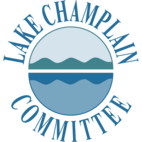Cyanobacteria monitors take to the lake for a 22nd season
LCC Summer's End 2024 E-News
Cyanobacteria naturally occurs in lakes and have existed on earth for millions of years. Under the right conditions they form large accumulations referred to as blooms. Some types produce toxins which release into the water especially when cyanobacteria die and break down. Not all cyanobacteria blooms are toxic, but since there is no way to tell if toxins are present without laboratory tests, it is always safest to avoid blooms and adhere to beach closures—when in doubt, stay out.

Each summer LCC trains, equips, and oversees New York Vermont, and Quebec community science volunteers throughout the Lake Champlain basin to report on cyanobacteria and water conditions. The program, now in its 22nd year, provides critical data from over 150 Lake Champlain and inland lake sites on where and when blooms are happening and helps keep people updated on whether the water is safe for recreation. Reporting results are publicly available on the Vermont Department of Health’s Cyanobacteria Tracker, which displays the most current data for Lake Champlain and Vermont inland lake sites. Sign up here to receive LCC’s weekly emails about water conditions.

LCC trains volunteer monitors to distinguish cyanobacteria from other floating phenomena, file accurate reports of water conditions, understand cyanobacteria's ecological and health effects, and take actions to reduce the frequency of blooms. Volunteers commit to report from the same site weekly (daily during blooms if possible) from mid-June through mid-fall. Repeatedly visiting the same location throughout the season provides a more accurate picture of water quality. This season, volunteers and partners have completed over 3,000 reports to date.
You can still get involved with cyanobacteria monitoring with LCC: learn more and sign up here to stay posted on upcoming trainings. We are particularly looking for monitors to cover geographic gaps in St. Albans Bay, Missisquoi Bay, and along the New York shoreline and to take over sites from seasonal park staff that have left their posts.
